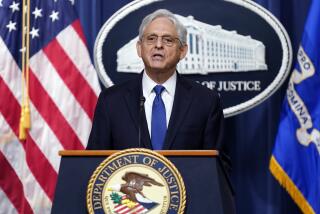Rove, Miers agree to testify about firings
Lawyers for former President George W. Bush, the House and the Obama administration reached agreement Wednesday to resolve a long-running dispute over the scope of executive power, which will allow lawmakers to question Bush aides Karl Rove and Harriet E. Miers about their role in the firing of nine federal prosecutors in 2006.
The pact follows weeks of negotiations led by White House Counsel Gregory Craig, who wanted to avert a federal court showdown that could have restricted the authority of the president in future disputes with other branches of government.
Under the terms of the deal, Rove, a former presidential advisor, and Miers, a former White House counsel, will testify before the House Judiciary Committee in transcribed interviews, under penalty of perjury, but without cameras, reporters or members of the public in attendance. The transcripts eventually will be published, the agreement said.
The settlement gives the House Judiciary Committee access to long-sought internal documents prepared by the Bush White House and the Justice Department from December 2004 through March 2007 about the politically explosive firing of nine U.S. attorneys.
Bush had ordered Rove and Miers not to testify, and the Judiciary Committee sued. In July, U.S. District Judge John Bates rejected Bush’s contention that senior White House advisors were immune from the committee’s subpoenas. The Bush administration appealed.
At first, Bush administration officials contended the prosecutors were let go because of poor performance. But an internal Justice Department investigation concluded that political considerations played a part in the firings of as many as four of the prosecutors.
The report singled out the removal of U.S. Atty. David Iglesias in New Mexico as the most troubling. Iglesias’ firing followed complaints from leading Republican political figures in New Mexico about his handling of voter fraud and public corruption cases. The report also found that H.E. “Bud” Cummins, the U.S. attorney in Arkansas, was forced out to make way for Timothy Griffin, who had been a Rove aide in the White House political office.
Atty. Gen. Michael B. Mukasey named a special prosecutor in September to investigate whether former Atty. Gen. Alberto R. Gonzales, other Bush administration officials or Republicans in Congress should face criminal charges in the firings.
In the deal Wednesday, lawmakers reserved the right to ask the onetime Bush aides to testify in public and made clear that Congress could revive its lawsuit if former administration officials strayed from the agreement. Lawmakers are just as interested in “decisions to retain certain U.S. attorneys” and whether selective prosecutions may have taken place, the agreement said.
“We have finally broken through the Bush administration’s claims of absolute immunity,” said House Judiciary Committee Chairman John Conyers Jr. (D-Mich.). “This is a victory for the separation of powers and congressional oversight.”
House Speaker Nancy Pelosi (D-San Francisco) cheered the agreement and said that “when there are credible allegations about the politicization of law enforcement, the need for congressional oversight is at its greatest.”
Lawmakers agreed not to ask Rove or Miers about privileged conversations with members of the Bush White House legal team, and they will not be able to see “four pages of particularly sensitive privileged material” to be described by a representative for Bush, the agreement said.
Rob Saliterman, a spokesman for Bush, said the former president acted “at the urging of the Obama administration, and in consideration of the executive branch interests at stake.”
Robert D. Luskin, a lawyer for Rove, called the agreement “good news” and said the former White House advisor had merely followed Bush’s direction on executive privilege.
More to Read
Sign up for Essential California
The most important California stories and recommendations in your inbox every morning.
You may occasionally receive promotional content from the Los Angeles Times.










